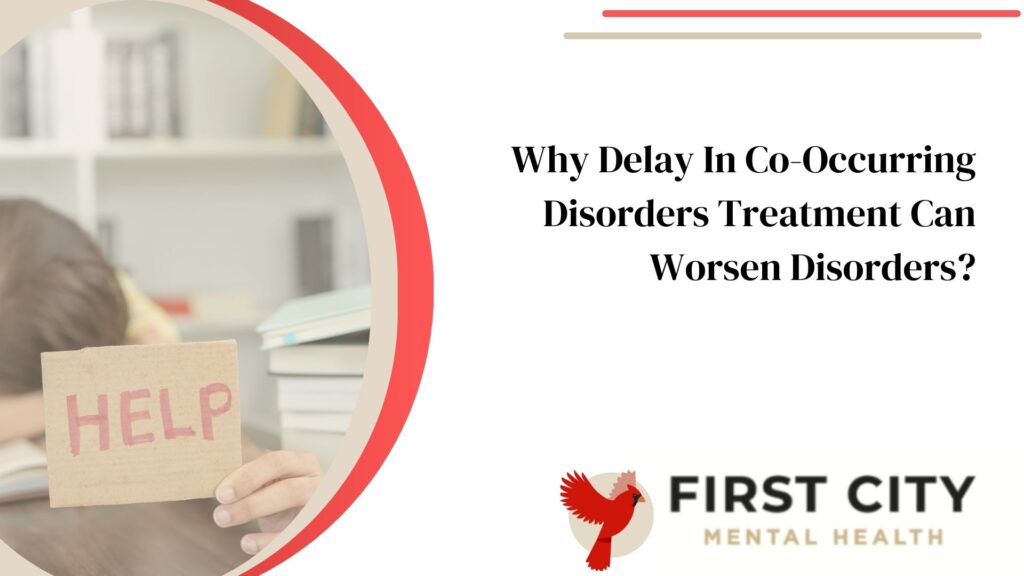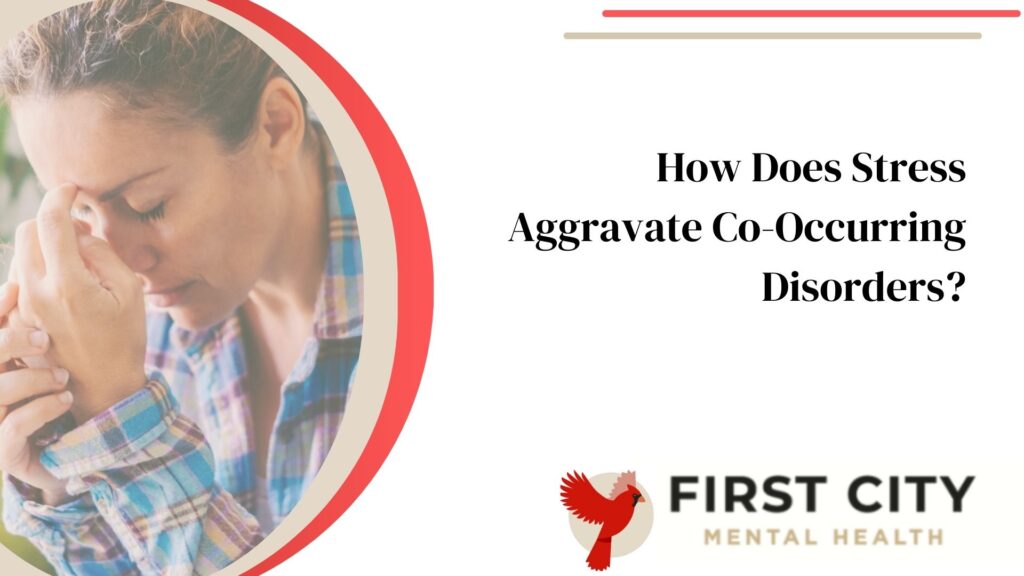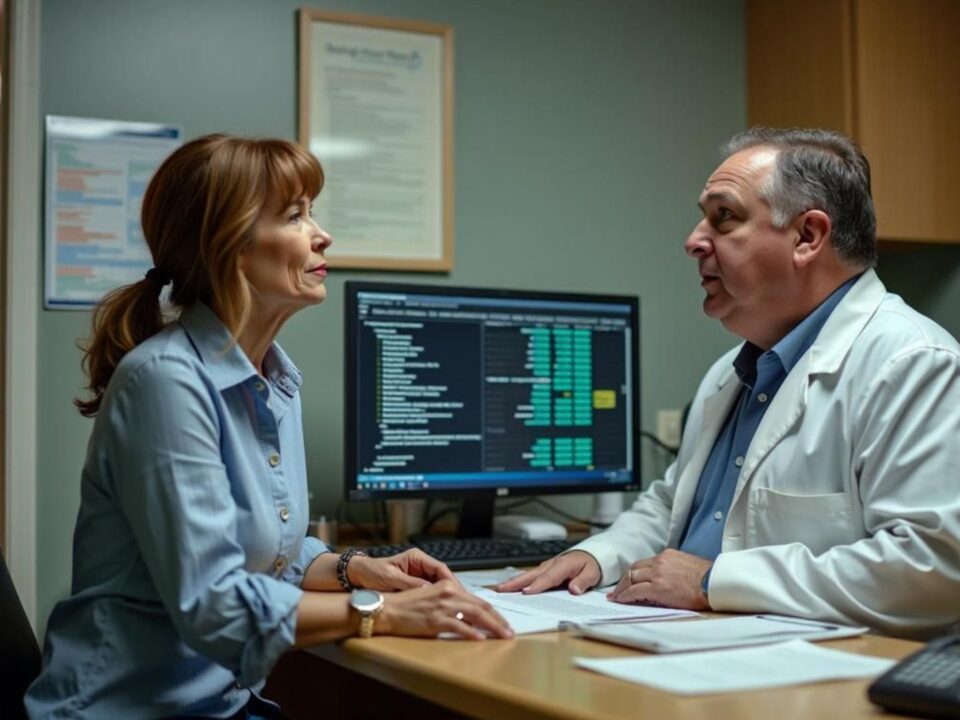
Why Early Intervention In Co-Occurring Disorders Treatment Matters?
January 21, 2025
How Co-Occurring Disorders Treatment Centers Enhance Recovery Outcomes
January 21, 2025Navigating the complexities of mental health can be challenging, especially when dealing with co-occurring disorders. Recognizing the need for a specialized treatment program becomes crucial when symptoms of a co occurring disorder overlap and standard interventions fall short. Co-occurring disorders treatment is designed to address both mental health issues and substance use disorders simultaneously, offering a more comprehensive approach compared to traditional methods that may only focus on one aspect. This dual-focused strategy ensures that individuals receive the holistic care needed for effective recovery, marking a clear contrast from the segmented treatments of the past.
Key Takeaways
- Recognizing the early warning signs of co-occurring mental disorders, such as sudden changes in behavior or mood, is crucial for timely intervention and treatment.
- Delaying treatment for co-occurring disorders can lead to a worsening of both mental health and substance use issues, making recovery more challenging.
- Understanding the interplay between mental health issues and substance use is key; one often exacerbates the other, necessitating an integrated treatment approach.
- Identifying when professional help is needed is a critical step; look for persistent problems in daily functioning or if self-help strategies have failed.
What Are The Early Warning Signs Of Co-Occurring Disorders?
Identifying early warning signs of co-occurring disorders is crucial for timely intervention. These disorders, where a person suffers from both a mental health issue and substance abuse, require specialized co-occurring disorders treatment. In places like co-occurring disorders treatment Kokomo, Indiana, awareness and access to treatment have been growing, but recognizing the signs remains key.
One major sign is a noticeable behavior change. This could include sudden withdrawal from social activities or losing interest in once enjoyable hobbies. Mood swings are common, with individuals experiencing intense emotions that seem disproportionate to the situation at hand. Another red flag is an increased reliance on substances like alcohol or drugs as a way to cope with stress or emotional pain, which can quickly escalate into drug abuse, complicating mental health issues further.
Physical health changes also signal trouble. Unexplained weight loss or gain, disrupted sleep patterns, and neglect of personal hygiene can all point toward co-occurring disorders. It’s important to note these changes and seek help promptly. Treatment options vary but often include a combination of medication, counseling, and support groups designed to address both the mental health condition and substance abuse simultaneously.
Resources are available for those in Kokomo, Indiana, seeking treatment for co-occurring disorders. Facilities here offer programs tailored to the unique needs of individuals facing these complex challenges. By recognizing the early signs and taking action, recovery is within reach.
Why Delay In Co-Occurring Disorders Treatment Can Worsen Disorders?

Recognizing early warning signs is crucial in addressing co-occurring disorders. However, delaying co occurring disorders treatment can have severe consequences. When treatment for these disorders is postponed, individuals often experience a worsening of symptoms. This can lead to a more complex and challenging recovery process. Environmental factors, such as trauma history and family background, can also play a significant role in the development and exacerbation of co-occurring disorders.
One reason for the exacerbation is that untreated mental health issues can drive individuals towards substance abuse as a form of self-medication. Over time, this can develop into a dependency, creating a vicious cycle that is hard to break. Substance abuse can also intensify the symptoms of the mental health disorder, making them more difficult to manage.
Moreover, the longer co-occurring disorders go untreated, the greater the impact on an individual’s personal life. Relationships may suffer, employment could be lost, and legal issues might arise. These additional stressors can further complicate the path to recovery.
Early intervention is key to preventing these outcomes. Effective treatment for co-occurring disorders typically involves a combination of medication management, therapy, and support groups. This integrated approach addresses both the mental health condition and substance use disorder simultaneously, offering the best chance for a successful recovery.
When Does Mental Health Impact Substance Use Disorder?
Mental health significantly impacts substance use when a mental disorder co-occurs with substance abuse. These intertwined issues often feed into each other, making it hard to discern where one ends and the other begins. For many individuals, mental health problems like anxiety, depression, or PTSD may lead to substance use as a form of self-medication. This attempt to alleviate mental distress through drugs or alcohol can spiral into addiction.
Integrated treatment for co-occurring disorders is crucial in these situations. It addresses both the mental health condition and the substance use disorder simultaneously. Traditional approaches that treated these issues separately often failed because they did not consider the complex interplay between mental health and substance abuse. Integrated treatment plans are designed with this complexity in mind. They offer a more holistic approach, combining therapy, medication management, and support services to tackle both issues together.
The key to successful outcomes lies in recognizing the signs early on. Symptoms like increased reliance on substances following stressful events or using drugs and alcohol to cope with emotional pain are red flags. Early intervention with an integrated treatment plan can prevent the escalation of co-occurring disorders. It can help individuals achieve better long-term recovery by addressing the root causes of their conditions rather than just the symptoms.
In essence, mental health impacts substance use most profoundly when there are co-occurring disorders. Addressing them together through integrated treatment is essential for effective recovery. This approach not only treats the symptoms but also aims at the underlying issues, offering a pathway to a healthier, substance-free life.
How To Identify The Need For Professional Help?

Identifying the need for professional help in treatment for co-occurring disorders starts with recognizing the signs that someone cannot manage both their substance use and mental health issues alone. These signs may include a noticeable decline in personal, work, or school responsibilities, withdrawal from social activities, increased risk-taking behaviors, or worsening of mental health symptoms despite attempts to self-manage.
One key indicator is the inability to reduce substance use despite negative consequences. This shows a level of dependency that likely requires specialized intervention. Similarly, if mental health issues persist or worsen even when substance use is reduced or stopped, it’s a clear sign that professional assistance is needed.
Professionals skilled in treating co-occurring disorders can offer a comprehensive approach that addresses both mental disorders and substance use aspects to create a tailored treatment plan. They assess both the mental health and substance use aspects to create a tailored treatment plan. This often includes therapy, medication management, and support groups designed to address both conditions simultaneously.
It’s crucial to seek help early. Early intervention can prevent the conditions from worsening and improve the chances of recovery. Family members and friends should be supportive and encourage their loved ones to pursue professional treatment if they observe these warning signs.
Where Can You Get An Evaluation For Co-Occurring Disorders?
Identifying the need for professional help is a critical first step. The next phase involves finding where to get an accurate evaluation for co-occurring disorders. Co-occurring disorders treatment centers specialize in diagnosing and treating individuals with both mental health disorders and substance use disorders. These centers employ a comprehensive approach, integrating services to address both conditions simultaneously.
Several types of facilities offer evaluations for co-occurring disorders. Psychiatric hospitals have units dedicated to dual diagnosis, providing intensive care and supervision. Outpatient clinics allow individuals to receive assessments and treatments without the need for hospitalization. They cater to those who may have work or family commitments. Community mental health centers are another option, often offering sliding scale fees based on income. These centers aim to make evaluations and treatments accessible to a wider audience.
For a more specialized approach, private practices with psychiatrists or psychologists experienced in dual diagnosis and co-occurring disorders treatment can provide personalized care. Lastly, university-affiliated programs offer cutting-edge treatment options, often participating in research studies that could benefit patients directly.
It’s essential to choose a facility that not only performs thorough evaluations but also has a robust treatment program tailored to individual needs. A detailed assessment should include psychiatric evaluations, medical exams, and substance use assessments. This comprehensive approach ensures that all aspects of a person’s health are considered, leading to more effective treatment plans.
Integrated Treatment Approaches
Integrated treatment approaches are considered the gold standard for managing co-occurring disorders. Unlike traditional methods that treat substance abuse and mental health issues separately, integrated treatment addresses both conditions simultaneously. This holistic approach is crucial because the symptoms of one disorder can often exacerbate the other.
Integrated treatment typically involves a combination of behavioral therapies and medication management. Cognitive-behavioral therapy (CBT) and dialectical behavior therapy (DBT) are commonly used to help individuals develop healthier coping mechanisms and manage their symptoms. Medication may also be prescribed to address specific mental health conditions or to assist with substance withdrawal and cravings.
Treatment Settings: Options and Considerations
Treatment for co-occurring disorders can take place in various settings, each offering different levels of care and support. Inpatient treatment facilities provide 24-hour care and are often recommended for individuals with severe co-occurring disorders. These facilities offer a structured environment where patients can focus entirely on their recovery without the distractions and triggers of everyday life.
Outpatient treatment, on the other hand, allows individuals to receive therapy and support while continuing to live at home. This option is suitable for those with less severe symptoms or strong support systems. Outpatient programs can vary in intensity, from regular weekly sessions to more intensive daily programs.
Therapy and Detox: What to Expect
Therapy is a cornerstone of treatment for co-occurring disorders. Behavioral therapies, such as cognitive-behavioral therapy (CBT) and dialectical behavior therapy (DBT), are particularly effective in helping individuals manage their symptoms. These therapies focus on changing negative thought patterns and behaviors, teaching coping strategies, and improving emotional regulation.
Detoxification, or detox, is often the first step in treating co-occurring disorders. During detox, individuals undergo a medically supervised process to safely withdraw from substances. This phase can be challenging, but it is crucial for clearing the body of harmful substances and preparing for further treatment. Detox can be conducted on an inpatient or outpatient basis, depending on the individual’s needs and the severity of their substance use disorder.
What Are The Consequences Of Ignoring Co-Occurring Disorders?
Ignoring co-occurring disorders can lead to severe repercussions for those affected. Without addressing both the mental health issue and the substance use disorder, individuals may experience a worsening of their symptoms. This can result in an increased risk of hospitalization and a higher likelihood of encountering legal problems. Moreover, untreated co-occurring disorders often lead to poorer treatment outcomes for both conditions.
The cycle of addiction and mental illness can become more entrenched over time. People might find themselves using substances as a way to self-medicate, only to discover that their mental health symptoms intensify. This can push them further into substance abuse, creating a vicious cycle that’s hard to break without professional intervention.
Furthermore, relationships with family and friends often suffer when co-occurring disorders are not treated. The strain of dealing with these issues without help can lead to isolation, which only exacerbates the individual’s condition. Employment and financial stability are also at risk, as the ability to maintain consistent work can be compromised.
Adult co-occurring disorders treatment is designed to treat co occurring disorders by addressing both the mental health condition and the substance use disorder simultaneously. By seeking comprehensive treatment, individuals can improve their chances of recovery and reduce the risk of long-term consequences. It’s crucial for anyone struggling with these issues to get evaluated and explore treatment options as soon as possible, following up on recommendations from evaluations for co-occurring disorders.
How To Know If Standard Treatment Isn’t Enough?
Recognizing when standard treatment falls short is crucial for those dealing with co-occurring disorders. The signs can be subtle, but they are there if you know what to look for. One clear indicator is minimal progress in managing symptoms. If weeks or months of treatment yield little improvement, it might not be the right approach. Another sign is the persistence of symptoms despite adherence to treatment plans. This shows that the current method isn’t fully addressing the underlying issues.
Moreover, an increase in the severity of symptoms can indicate that standard treatment for co occurring disorders are insufficient. This could manifest as heightened anxiety, deeper bouts of depression, or more frequent substance use. It’s a signal that the complexities of co-occurring disorders need a more tailored approach. Experiencing new or worsening side effects from medication suggests that the treatment plan requires adjustments.
It’s essential to communicate openly with healthcare providers about these signs. They can offer insights into alternative therapies or adjustments to current treatments. Remember, finding the right treatment for co-occurring disorders often involves trial and error. It’s a process that requires patience and persistence.
In cases where standard treatments don’t seem to work, exploring comprehensive programs specifically designed for co-occurring disorders becomes necessary. These programs consider the intertwined nature of mental health and substance abuse issues, offering a more holistic approach to recovery.
How Does Stress Aggravate Co-Occurring Disorders?

Stress plays a significant role in worsening co-occurring disorders. It acts as a trigger that can intensify the symptoms of both mental health issues and substance abuse problems. When individuals face high levels of stress, their coping mechanisms often falter, leading them to rely more heavily on substances or negative behaviors associated with their mental health disorder.
This cycle of stress and increased dependency creates a challenging environment for treatment. Treatment of co-occurring disorders must, therefore, address not only the disorders themselves but also the stressors that exacerbate them. Effective co-occurring disorders treatment programs incorporate stress management techniques as a core component. These programs teach individuals how to identify stressors and develop healthier coping strategies.
Moreover, stress can hinder recovery by impairing decision-making and motivation. Individuals under stress may find it harder to commit to their treatment plans or to seek help in the first place. This is why personalized care plans that consider an individual’s unique stressors and triggers are essential in the treatment of co-occurring disorders.
Final Thoughts
Understanding the early warning signs of co-occurring disorders and recognizing the need for professional co-occurring disorders treatment program are crucial steps in managing these complex conditions. Delaying treatment can significantly worsen both mental health and substance use issues, making it imperative to seek evaluation and support without hesitation. Stress, if not managed properly, can further aggravate these disorders, highlighting the importance of comprehensive care that addresses both mental health and substance use simultaneously.
If you or someone you know is struggling, remember that ignoring the symptoms can lead to severe consequences. Standard treatment might not suffice for everyone, which is why tailored approaches are vital for effective recovery. Don’t let the fear of seeking help or the stigma associated with these disorders deter you from taking that critical first step towards healing. Reach out to a healthcare provider today and begin your journey to recovery. Your health and well-being are worth it.
Frequently Asked Questions
Why is it crucial not to delay treatment for co-occurring disorders?
Delaying treatment can exacerbate both mental health and substance use issues, leading to more severe health complications and making recovery more challenging.
How does mental health affect substance use in co-occurring disorders?
Mental health issues can drive an individual towards substance use as a form of self-medication, worsening both the mental condition and the substance dependency over time.
When should one seek professional help for co-occurring disorders?
Seek professional help if you or someone you know is experiencing persistent psychological distress along with substance abuse problems. Early intervention can significantly improve outcomes.
Where can evaluations for co-occurring disorders be obtained?
Evaluations can be obtained from mental health professionals specializing in co-occurring disorders, such as psychiatrists, psychologists, or specialized treatment centers.
What are the risks of ignoring co-occurring disorders?
Ignoring co-occurring disorders can lead to deteriorating mental and physical health, strained relationships, financial problems, and potentially life-threatening situations.






